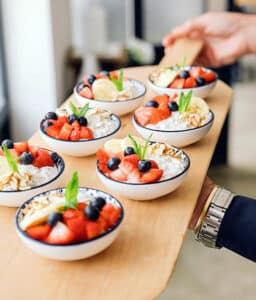Balanced nutrition and diets
More and more people are choosing to follow a specific diet (vegan, vegetarian, raw food, etc.) or a restrictive diet (low-carb, low-fat, etc.).
However.
By excluding whole food groups from our diet, we put ourselves at risk of nutrient deficiencies.
And.
If our body doesn’t get everything it needs – it starts to save and provide the nutrients for the vital processes only (brain function, breathing, etc.).
As a result, we feel tired and depressed, have no energy, our skin loses elasticity, our hair becomes brittle or starts to fall out, our nails peel…
The number of people who want to follow a specific dietary regime is increasing.
Some people cannot eat certain foods because of allergies or illnesses, but most people avoid certain foods because of prejudices or because they follow a fad diet in the hope of losing weight.
And.
They damage their health for years.
And they are who this article is for – how to balance your diet while following restrictive diets to give your body everything it needs.
In other words, eliminating foods doesn’t mean you have to stay without the nutrients they contain, but you should be more mindful of what you put in your mouth to make up for missing nutrients from other foods.
Low-carbohydrate diets
There are many versions of low-carbohydrate diets, and they are often chosen to reduce body weight. Carbohydrates in these diets typically provide less than 26% of total daily calorie consumption.
The most extreme (and most popular) of these are:
- The ketogenic (keto) diet – a low-carb, high-fat diet that limits carbohydrate intake to 5-10% of total daily calorie intake. To give you an idea of how extreme this is, one medium-sized apple (120 g) contains ~14 g of carbohydrates = 56 Kcal. A non-overweight woman needs ~1600 Kcal per day – so she can eat 2.5 apples per day, and that’s it – no more fruits, vegetables, cereals, beans, seeds, nuts… – just fat and protein 😊.
- Atkins diet. In the first phase of this diet, carbohydrate intake is limited to about 20 g per day (depending on the plan chosen). During the diet, carbohydrate intake gradually increases but usually does not exceed 100 g per day.
- South Beach diet. This diet not only reduces carbohydrate intake but also encourages the eating of lean meat. Cereals and fruit are prohibited during the initial phase.
- The Paleo diet mimics the eating habits of our hunter-gatherer ancestors and is naturally low in carbohydrates.
- The Dukan diet significantly restricts carbohydrate intake. It is high in protein and low in fat.
Low-carbohydrate diets can indeed help control blood sugar levels in people with diabetes. But we still don’t know what their long-term effects on the body are. Low-carbohydrate diets are also difficult to follow and can lead to fatigue, difficulty concentrating and constipation as many sources of fibre are excluded.
If you really want to try a low-carbohydrate diet, instead of cutting out all carbohydrates, it is better to choose healthier types of carbohydrates. Wholegrain products such as brown rice, wholemeal pasta, bulgur, wheat and oats, among other nutrients, contain more fibre and, therefore, help both – avoid constipation and feel fuller for longer.
Another way to reduce sugar intake is to give up fruit and vegetable juices and smoothies, sweetened drinks, cakes, biscuits and other sweets (as these are high in calories but low in nutrients).
Dairy-free diet
As a rule, dairy products are excluded from the diet of those who have:
- Lactose intolerance (there is not enough of the enzyme lactase in the intestine to digest the lactose (milk sugar)).
- Allergy to cow’s milk.
- Other sensitivities to dairy products (which are often imaginary!).
Cheese and other dairy products are one of the most important sources of saturated fat. In theory, avoiding saturated fat could have a beneficial effect on your heart health.
But it’s not that simple.
Dairy products are also an important source of calcium, riboflavin (vitamin B2), iodine, vitamin D and protein, so if dairy products are excluded from the diet, other foods that provide adequate intakes of these nutrients should be included:
- To get enough calcium, add foods such as sardines or canned salmon (with bones), green leafy vegetables such as broccoli, okra or cabbage, beans, lentils, tofu, nuts and plant-based milk alternatives such as soya, almond or oat milk to your diet.
- To get enough iodine, supplement your diet with seaweed (Kombu Kelp, Wakame and Nori), shrimps, tuna, eggs, prunes and Lima beans. Add iodised salt instead of regular table salt when cooking.
- To get enough riboflavin (vitamin B2), include eggs, lean beef, offal (such as beef liver), chicken breast, salmon, almonds, spinach, mussels and mushrooms in your diet.
- The best sources of vitamin D are oily fish (salmon, mackerel and sardines), egg yolks, red meat and liver.
Coconut-based products (butter, milk, flour…) have also become a popular alternative to dairy products but can be high in saturated fat. In other words, they may not be as healthy as they seem. A food is considered high in saturated fat if it contains more than 5 g per 100 g of product or more than 6 g per serving.
Information on labelling of milk and milk products (important for people who are lactose intolerant or allergic to cow’s milk):
- The label ‘non-dairy’ on a product means the product does not contain butter, cream or milk. However, the product may contain other ingredients containing milk.
- The label ‘lactose-free’ does not mean that the product does not contain milk. The product may still contain milk or milk products, so always read the entire contents of the product.
- Kosher foods labelled ‘pareve’ or ‘parve’ are almost always dairy-free. A ‘D’ on a product label next to a circled ‘K’ or ‘U’ means it contains milk protein.
Gluten-free diet
A gluten-free diet excludes all foods that contain gluten (a protein found in wheat and several other cereals).
This means eating only whole, gluten-free foods such as fruit, vegetables, meat and eggs or ultra-processed foods such as gluten-free bread, pasta, etc.
A gluten-free diet is usually followed by:
- People with coeliac disease (an autoimmune reaction to gluten that causes intestinal damage).
- People with a wheat allergy or gluten sensitivity.
People with coeliac disease cannot tolerate gluten in any form and must follow a gluten-free diet for the rest of their lives ( around 1% of people have coeliac disease, and only 1-2% of the world’s population is gluten intolerant to varying degrees!).
At the same time, there are quite a lot of people who believe that eliminating gluten-containing products from their diet can reduce their weight and improve their health (because gluten-free products are advertised as healthy).
Weight does indeed decrease in some cases, not because they are eliminating gluten from their diet, but because by cutting out gluten, they are also automatically cutting out most ultra-processed foods and refined carbohydrates.
Life without bread and other cereals is not pleasant, but you are unlikely to face a nutrient deficiency if you eat enough:
- Fruit and vegetables.
- Legumes.
- Dairy products.
- Gluten-free whole-grain products (e.g. oat flour products).
- Nuts and seeds.
- Lean meat, fish and other seafood.
Vegan and Vegetarian diet
Vegetarians do not eat animal or poultry meat and, in some cases, fish. Vegans exclude not only meat and fish from their diet but also milk and dairy products, eggs and other animal-derived ingredients, for example, honey.
The most common forms of vegetarianism are:
- Lacto-ovo vegetarians avoid all animal meat and eat dairy and egg products.
- Lacto-vegetarians avoid animal meat and eggs but eat dairy products.
- Ovo vegetarians avoid all animal products except eggs.
- Vegans avoid all animal and animal-derived products.
Some people avoid certain types of meat, such as “red meat”, but eat other types of meat (semi-vegetarianism):
- Pesco-vegetarians do not eat any kind of meat except fish or other aquatic animals.
- Pollo-vegetarians do not eat all meat except poultry.
- Flexitarianism or “flexible vegetarianism” is a diet based on vegetarian products but may exceptionally include meat.
Each of these types of vegetarianism has different risks of nutrient deficiencies. In the following, we will only look at the vegan diet, as its adherents are most at risk of nutrient deficiencies.
Vegan diet
Vegan diets are rich in nutrient-dense foods such as fruit, vegetables, whole grains, nuts, seeds and soya products.
In other words, a vegan diet is low in saturated fat and cholesterol and high in vitamins, minerals, fibre and healthy plant compounds.
On the other hand, vegan diets are often too low in iron, calcium, zinc, vitamin D, vitamin B12, omega-3 fatty acids, iodine and some essential amino acids (building blocks of protein), so dietary planning must be carefully considered to avoid health problems:
- Iron. Iron from plants (non-heme iron) is less well absorbed by the body than the heme iron in animal products, so:
- To improve iron absorption, vegans should include vitamin C-containing foods such as citrus fruits, strawberries, bell peppers and broccoli in their diet.
- Eat iron-rich foods such as lentils, chickpeas, tofu, tempeh (fermented soya beans), spinach, quinoa…
- Calcium. For omnivores, milk and dairy products are the main source of calcium. For vegans, good plant sources of calcium are calcium-fortified plant milk, fortified orange juice, tofu made with calcium sulphate, almonds, tahini (sesame seed paste) and dark green leafy vegetables (kale, bok choy), chia, amaranth and teff
- Zinc. Good plant-based sources of zinc are tempeh, wholemeal products, tofu, quinoa, wheat germ, pumpkin seeds, lentils, couscous, wholemeal rice, cashew nuts, sesame seeds and tahini.
- Vitamin D. Vitamin D can be synthesised by the body in sunlight, but vegans may still be deficient, especially if they live in areas where sunlight is limited. Vitamin D intake can be boosted with supplements or foods fortified with vitamin D, such as plant-based milk substitutes, breakfast cereals, etc. Good sources of plant-based vitamin D are mushrooms and soya yoghurt.
- Vitamin B12. Vitamin B12 is mainly found in animal products, and its deficiency is associated with anaemia and nervous system damage. To address this problem, vegans can take supplements and foods fortified with B12, such as plant-based milk substitutes, breakfast cereals, nutritional yeast, etc.
- Omega-3 fatty acids. Omega-3 fatty acids are found in plant products such as flaxseed, chia seeds, hemp seeds and walnuts, but mainly in the form of alpha-linolenic acid (ALA). Our bodies can convert ALA into EPA and DHA, the biologically most active forms of omega-3 found in oily fish. However, this conversion process is not very efficient. Vegans can also take algae supplements to ensure adequate intake of EPA and DHA.
- Iodine. Adequate iodine intake is essential for the healthy functioning of the thyroid gland, which regulates our metabolism. The amount of iodine in plant foods depends on the iodine content of the soil they are grown (foods grown near the ocean generally have a higher iodine content). The only foods that consistently contain high levels of iodine are iodised salt, seafood and seaweed.
- Proteins. Protein is significantly lower in plant products than in animal products. This can be a serious problem, especially if protein requirements are higher due to physical activity or pregnancy. However, vegans can also get enough protein if they plan their diet properly. Good sources of plant-based protein are seitan, tofu, beans, lentils and mycoprotein. Protein can also be obtained (albeit in small amounts) from vegetables such as broccoli, spinach, asparagus, artichokes, potatoes, sweet potatoes and Brussels sprouts (average 4 to 5 g protein per cup) and fruits such as guavas and cherimoyas, mulberries, blackberries, nectarines and bananas (average 2 to 4 g protein per cup).
Key takeaways
The exclusion of products and whole food groups from the diet is, in my view, only justified on real, not imaginary, medical grounds. In other words, there must be a specific diagnosis by a doctor and dietary recommendations to match.
Otherwise, we risk a nutrient deficiency and the health and/or beauty problems this causes.
This is very serious because if you do not know how to compensate for the nutritional deficiencies caused by various dietary restrictions – you could suddenly find yourself in the hospital.
And.
Remember that not everything is gold that glitters.
In other words, the more a diet is promoted and the more ear-pleasing its promises – the less healthy it is.
But.
We are all grown people, and we are responsible for the decisions we make.
As long as you feel good, full of energy and have no problems with your skin, hair and nails – experiment if it makes you feel better.
If not, your eating habits may need to change.
Eat a balanced diet, move and – be healthy!
Clinical Evidence of Low-Carbohydrate Diets against Obesity and Diabetes Mellitus
Benefits of Low Carbohydrate Diets: a Settled Question or Still Controversial?
The Merits and the Pitfalls of Low Carbohydrate Diet: A Concise Review
Low Carbohydrate Dietary Approaches for People With Type 2 Diabetes—A Narrative Review
Dairy’s role in supporting a healthy immune system
Lactose Intolerance and Bone Health: The Challenge of Ensuring Adequate Calcium Intake
Lactose-Free v. Dairy-Free: How to Tell the Difference
Dairy-Free and Non-Dairy: Milk-Allergic Consumers?
How well do plant based alternatives fare nutritionally compared to cow’s milk?
Health Consequences of Iodine Deficiency
Position of the American Dietetic Association: vegetarian diets
Comparative fracture risk in vegetarians and nonvegetarians in EPIC-Oxford
How prevalent is vitamin B(12) deficiency among vegetarians?
Vitamin B12, folic acid, and the nervous system
Vitamin B12 sources and bioavailability
Vitamin B12-Containing Plant Food Sources for Vegetarians
The control of calcium and phosphorus metabolism by the vitamin D endocrine system
Vitamin D deficiency: a worldwide problem with health consequences
Omega-3 polyunsaturated fatty acids and vegetarian diets
Review on iron and its importance for human health
Considerations in planning vegan diets: children
Iodine status and thyroid function of Boston-area vegetarians and vegans

Help to maintain this site, create interesting articles and delicious low-calorie recipes!
Share this article
Follow me on Facebook
I recommend reading these articles as well

An unhealthy diet shortens life more than smoking!
One in five of us dies prematurely because of our unhealthy eating habits.

Superstition, science and conscious eating
Or why a glass of lemon water is sometimes just a glass of lemon water

Superfoods
What are superfoods? What are superfoods good for? What do they do, and how are they good for our health and well-being?

Functional workouts
What is a functional workout (or fitness)? How do Functional Workouts differ from other types of exercise? What are the benefits of Functional Training?

